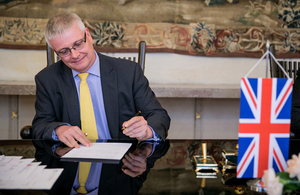"Enhancing industrial competitiveness should not be at the expense of tackling climate change”
Following last week’s announcement of the EU 2030 Climate and Energy package, Ambassador Robin Barnett sets out the UK Government's position on the European Commission’s proposals.

The EU 2030 Climate and Energy package is an opportunity to set a framework for a more competitive, sustainable Europe, which learns the lessons of the past and meets the needs of businesses and consumers alike. It has the potential to speed up energy investment, boost low carbon growth and improve EU energy security, whilst helping avoid the costs of extreme climate change. Whilst the UK welcomes the Commission’s proposals for a 40% domestic GHG target, we remain of the view that the EU will need to go further, up to 50% in the context of a global climate deal. Furthermore, we remain concerned about the proposals around a binding EU level renewables target.
The EU faces many challenges, and the challenge of how to build a competitive economy for the future while tackling climate change is one of the most pressing. Enhancing industrial competitiveness should not be at the expense of tackling climate change. But any action should be done in a cost effective way and also seek to address the significant energy costs that EU industry faces and which have major implications for competitiveness, as the European Commission highlighted last week.
The Commission proposal for a 2030 greenhouse gas emission reduction of 40% will keep Europe on the cost-effective pathway to meet the EU 2050 goal of 80-95%. Two pieces of UK modelling have shown that EU costs are manageable: for example that a 50% target would have costs equivalent to 0.025-0.04% of the EU’s GDP per year.
The UK supports a single greenhouse gas target, without subsidiary renewables or energy efficiency targets. An EU GHG target alone will result in significant levels of renewable energy in 2030 but crucially will also allow Member States the flexibility to develop their own cost-effective low carbon energy mix, taking advantage of all the domestic resources available to them, and encouraging the use of interconnection to exploit EU resources where they are most cost effective.
This would differ considerably to a world where we continue to develop renewable energy based on national burden sharing. National targets have in the past led to expensive and unsustainable subsidies, and renewables being developed where best suits the bureaucratic need, rather than where there are the best resources and where they are most cost effective. Analysis for the UK suggest that the difference in the distribution of renewable energy under a 30% RES target compared with that under a GHG target alone could cause €11bn of additional annual costs to be incurred in the EU as a whole in 2030.
There is simply no possibility of achieving our shared aims – a more competitive economy and a cleaner planet – without working together. By acting as one on climate change, the EU nations are more influential than if they were acting alone.
As the British Ambassador to Poland I reiterate those points and look forward to discussing these issues with our Polish colleagues and European Union partners during the course of the next few weeks.